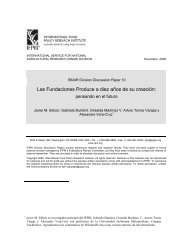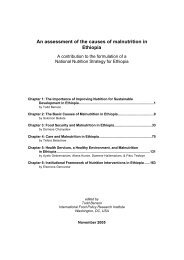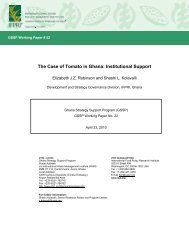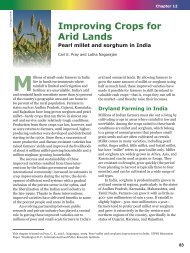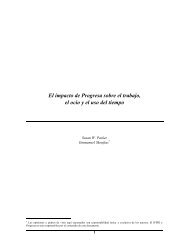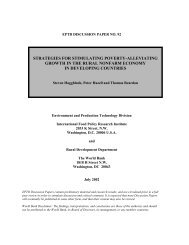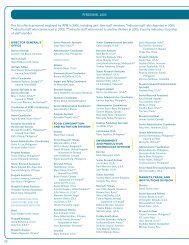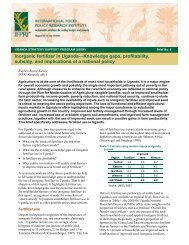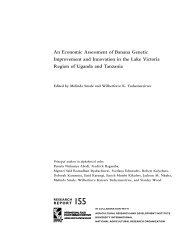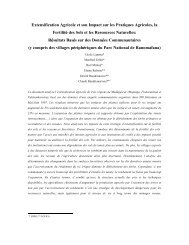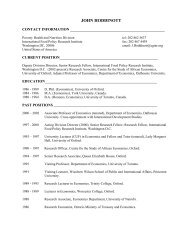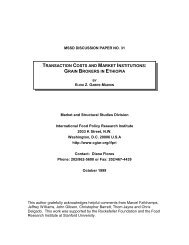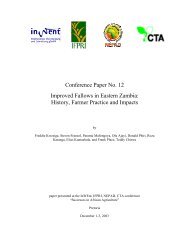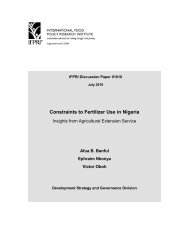- Page 1 and 2: IMPACT OF AGRICULTURAL MARKET REFOR
- Page 4 and 5: TABLE OF CONTENTS CHAPTER 1 - INTRO
- Page 6 and 7: 5.1.10 Expenditure patterns .......
- Page 8 and 9: CHAPTER 1 - INTRODUCTION 1.1 Backgr
- Page 10 and 11: villageois, (GV)) was needed as the
- Page 12 and 13: CHAPTER 2: POLICY BACKGROUND FOR BE
- Page 14 and 15: 2.3 Evolution of Economic Policy 2.
- Page 16 and 17: Under pressure from the World Bank
- Page 18 and 19: anking system has been restored to
- Page 20 and 21: Fertilizer can be imported outside
- Page 22 and 23: particularly urban wage-earners. On
- Page 26 and 27: led to a more sustainable agricultu
- Page 28: Table 2.4 - Gross farm revenue from
- Page 31 and 32: Malawi’s economy is heavily depen
- Page 33 and 34: the reduction of its operations in
- Page 35 and 36: crops is also difficult because tob
- Page 37 and 38: Table 3.1 CROP 1982/83 1983/84 1984
- Page 40 and 41: CHAPTER 4: RESULTS OF THE BÉNIN SM
- Page 42 and 43: where W v is the weight for a house
- Page 44 and 45: heads. This suggests that some of t
- Page 46 and 47: And school attendance is much highe
- Page 48 and 49: Crop production is the main activit
- Page 50 and 51: (33 percent). Livestock income is m
- Page 52 and 53: Somewhat surprisingly, the relation
- Page 54 and 55: It is no more common among richer h
- Page 56 and 57: production, and women actually spen
- Page 58 and 59: Seed use by crop Although only 18 p
- Page 60 and 61: Looking at the results by departmen
- Page 62 and 63: Ouémé presents an unusual case: j
- Page 64 and 65: Market prices have significant effe
- Page 66 and 67: policies of SONAPRA to discourage
- Page 68 and 69: crops are responsible for this incr
- Page 70 and 71: Respondents were asked whether the
- Page 72 and 73: Female-headed households, not surpr
- Page 74 and 75:
households are not considered credi
- Page 76 and 77:
In almost every category of agricul
- Page 78 and 79:
This discussion implies that farms
- Page 80 and 81:
eturns per hectare and labor-intens
- Page 82 and 83:
farm household and tends to be smal
- Page 84 and 85:
Surprisingly, the value of sales as
- Page 86 and 87:
Finally, proximity to an all-season
- Page 88 and 89:
Changes in crop marketing In this s
- Page 90 and 91:
Poor households are more likely to
- Page 92 and 93:
it is clear that virtually all grow
- Page 94 and 95:
production to total expenditure is
- Page 96 and 97:
a significant number of household (
- Page 98 and 99:
non-food spending. These are follow
- Page 100 and 101:
Larger farms are associated with hi
- Page 102 and 103:
This would not be surprising in lig
- Page 104 and 105:
Female-headed households appear to
- Page 106 and 107:
poorest expenditure category to jus
- Page 108 and 109:
headed household were more likely t
- Page 110 and 111:
Households in every expenditure cat
- Page 112 and 113:
An important result of this analysi
- Page 114 and 115:
oad network, although those citing
- Page 116 and 117:
questions posed by the IFPRI-LARES
- Page 118 and 119:
With regard to cotton marketing, al
- Page 120 and 121:
Village leaders were asked to ident
- Page 122 and 123:
Marketing patterns Village leaders
- Page 124 and 125:
4.3: Results of the Bénin Survey o
- Page 126 and 127:
4.3.2 Survey methods At the time of
- Page 128 and 129:
officers have CM2 certificates. Thi
- Page 130 and 131:
Suppliers The GV representatives we
- Page 132 and 133:
Cotton area per GV ranges from 145
- Page 134 and 135:
The largest cost items are schools
- Page 136 and 137:
members and 10 percent of the membe
- Page 138 and 139:
Table 4.1.1-Description of sample o
- Page 140 and 141:
Table 4.1.7-Age, education, and lit
- Page 142 and 143:
Table 4.1.13-Ethnic background of h
- Page 144 and 145:
Table 4.1.19-Importance of each sou
- Page 146 and 147:
Table 4.1.25-Number of plots and ar
- Page 148 and 149:
Table 4.1.31-Land tenure by expendi
- Page 150 and 151:
Table 4.1.37-Change in labor alloca
- Page 152 and 153:
Table 4.1.42-Seed use by sex of hea
- Page 154 and 155:
Table 4.1.47-Perceived change in av
- Page 156 and 157:
Table 4.1.54-Share of producers of
- Page 158 and 159:
Table 4.1.59-Fertilizer use by farm
- Page 160 and 161:
Table 4.1.64-Characteristics of fer
- Page 162 and 163:
Table 4.1.69-Change in fertilizer a
- Page 164 and 165:
Table 4.1.75-Allocation of labor by
- Page 166 and 167:
Table 4.1.82-Allocation of labor by
- Page 168 and 169:
Table 4.1.89-Change in credit avail
- Page 170 and 171:
Table 4.1.94-Percent of households
- Page 172 and 173:
Table 4.1.98-Percent of households
- Page 174 and 175:
Table 4.1.102-Area allocation by cr
- Page 176 and 177:
Table 4.1.106-Area allocation by cr
- Page 178 and 179:
Table 4.1.110-Marketed share of out
- Page 180 and 181:
Table 4.1.114-Marketed share of out
- Page 182 and 183:
Table 4.1.117-Regression for market
- Page 184 and 185:
Table 4.1.120-Change in the type of
- Page 186 and 187:
Table 4.1.128-Perceived change in r
- Page 188 and 189:
Table 4.1.135-Main reason for stori
- Page 190 and 191:
Table 4.1.140-Summary of food expen
- Page 192 and 193:
Table 4.1.142-Percent of households
- Page 194 and 195:
Table 4.1.144-Food consumption by e
- Page 196 and 197:
Table 4.1.149-Results of regression
- Page 198 and 199:
Table 4.1.152-Value of household as
- Page 200 and 201:
Table 4.1.156-Value of household as
- Page 202 and 203:
Table 4.1.160-Housing characteristi
- Page 204 and 205:
Table 4.1.162-Housing characteristi
- Page 206 and 207:
Table 4.1.165-Main source of water
- Page 208 and 209:
Table 4.1.170-Source of information
- Page 210 and 211:
Table 4.1.176-Source of information
- Page 212 and 213:
Table 4.1.181-Regression for percei
- Page 214 and 215:
Table 4.2.5-Change in number of veh
- Page 216 and 217:
Table 4.2.12-Availability and sourc
- Page 218 and 219:
Table 4.2.21-Number of GFs per vill
- Page 220 and 221:
Table 4.2.30-Percentage of villages
- Page 222 and 223:
Table 4.2.34-Distribution of villag
- Page 224 and 225:
Table 4.3.1-Distribution of GVs by
- Page 226 and 227:
Table 4.3.9-Number of each type of
- Page 228 and 229:
Table 4.3.12-Percentage of secretar
- Page 230 and 231:
Table 4.3.19-Distribution of GVs by
- Page 232 and 233:
Table 4.3.24-Percentage of inputs s
- Page 234 and 235:
Table 4.3.32-Average value of curre
- Page 236 and 237:
Table 4.3.40-Percentage of GVs in w
- Page 238 and 239:
CHAPTER 5 - RESULTS FROM THE MALAWI
- Page 240 and 241:
The weights are used to calculate a
- Page 242 and 243:
On average, around 20 percent of th
- Page 244 and 245:
agricultural work. Other less commo
- Page 246 and 247:
5.1.4 Time allocation In Malawi, as
- Page 248 and 249:
attributed it to the fact that fert
- Page 250 and 251:
insignificant. The coefficient on t
- Page 252 and 253:
As in the results from the previous
- Page 254 and 255:
most important sources of input on
- Page 256 and 257:
applied for credit compared to 20 p
- Page 258 and 259:
less than 1 mt per ha which are fai
- Page 260 and 261:
5.1.9 Agricultural marketing Market
- Page 262 and 263:
Households that belong to a club al
- Page 264 and 265:
most important contractors are the
- Page 266 and 267:
indicates that the extent of povert
- Page 268 and 269:
wheat, and fruits and nuts, a highe
- Page 270 and 271:
Surprisingly, the education of the
- Page 272 and 273:
Housing characteristics The overwhe
- Page 274 and 275:
It was also important to find out w
- Page 276 and 277:
Surprisingly, tobacco growers are m
- Page 278 and 279:
Over three-quarter of the EPAs repo
- Page 280 and 281:
The changes in the number and types
- Page 282 and 283:
5.2.11 Storage Facilities On averag
- Page 284 and 285:
Table 5.2 - Household characteristi
- Page 286 and 287:
Table 5.7 - Percentage of household
- Page 288 and 289:
Table 5.12 - Farm labor use and all
- Page 290 and 291:
Table 5.15 - Determinants of the de
- Page 292 and 293:
Table 5.17 - Sources of fertilizer
- Page 294 and 295:
Table 5.22 - Access and use of cred
- Page 296 and 297:
Table 5.25 - Percent of households
- Page 298 and 299:
Table 5.29 - Percent of households
- Page 300 and 301:
Table 5.34 - Crop disposal by type
- Page 302 and 303:
Table 5.38 - Determinants of Market
- Page 304 and 305:
Table 5.42 - Summary of expenditure
- Page 306 and 307:
Table 5.45 - Food consumption by so
- Page 308 and 309:
Table 5.47 - Percent of households
- Page 310 and 311:
Table 5.49 - Percent of households
- Page 312 and 313:
Table 5.51 - Food consumption by ex
- Page 314 and 315:
Table 5.56 - Determinants of per ca
- Page 316 and 317:
Table 5.59 Percent of households ow
- Page 318 and 319:
Table 5.62 - Characteristics of the
- Page 320 and 321:
Table 5.68 - Determinants of percei
- Page 322 and 323:
Table 5.71 - Average yields per cro
- Page 324 and 325:
Table 5.77 - Changes in the availab
- Page 326 and 327:
Figure 5.1 Distribution of househol
- Page 328 and 329:
Figure 5.7 - Percentage of Househol
- Page 330 and 331:
CHAPTER 6 - SUMMARY, CONCLUSIONS AN
- Page 332 and 333:
Fertilizer Half of the far
- Page 334 and 335:
Regression analysis indicates that
- Page 336 and 337:
Among those seeing improvement, the
- Page 338 and 339:
Agricultural markets Three quart
- Page 340 and 341:
The economic reforms have boosted p
- Page 342 and 343:
department. The farms with very lit
- Page 344 and 345:
Strengthen the extension service by
- Page 346 and 347:
The most time-consuming agricultura
- Page 348 and 349:
Most common means of transport to t
- Page 350 and 351:
Small farmers in Malawi are mainly
- Page 352 and 353:
households have less assets and les
- Page 354 and 355:
Place more serious efforts to impro
- Page 356 and 357:
REFERENCES Ahoyo Adjovi, N.R. and F



